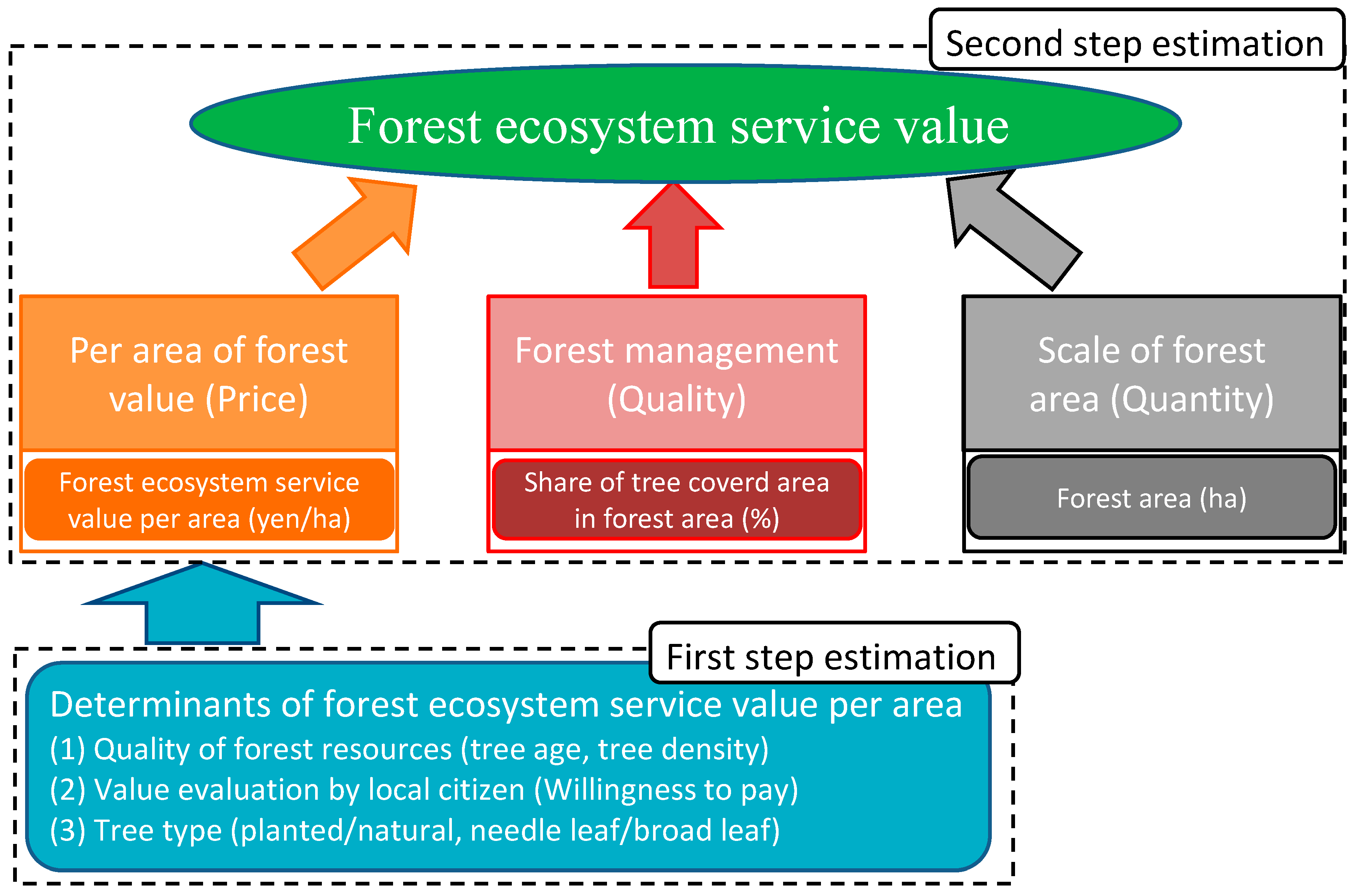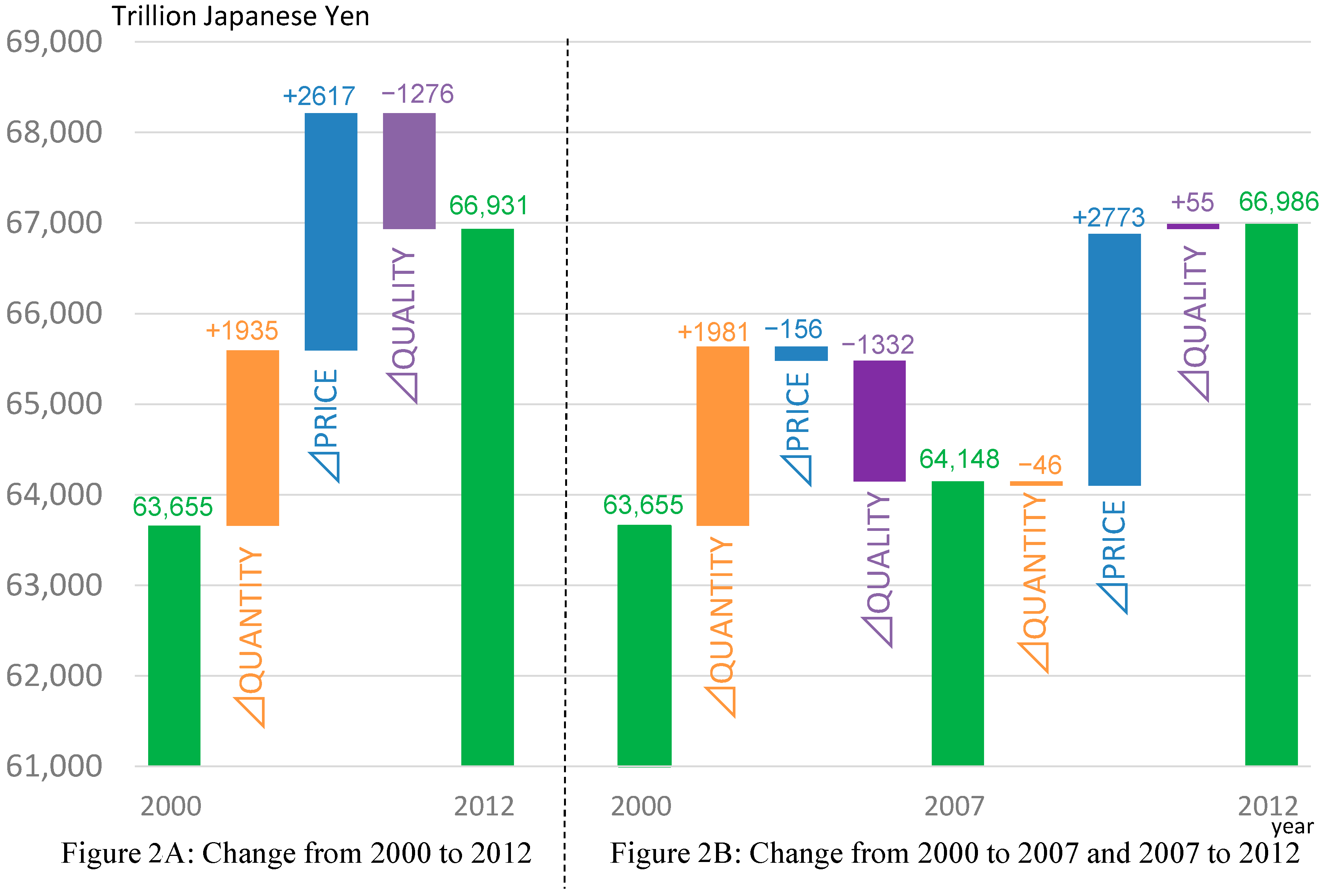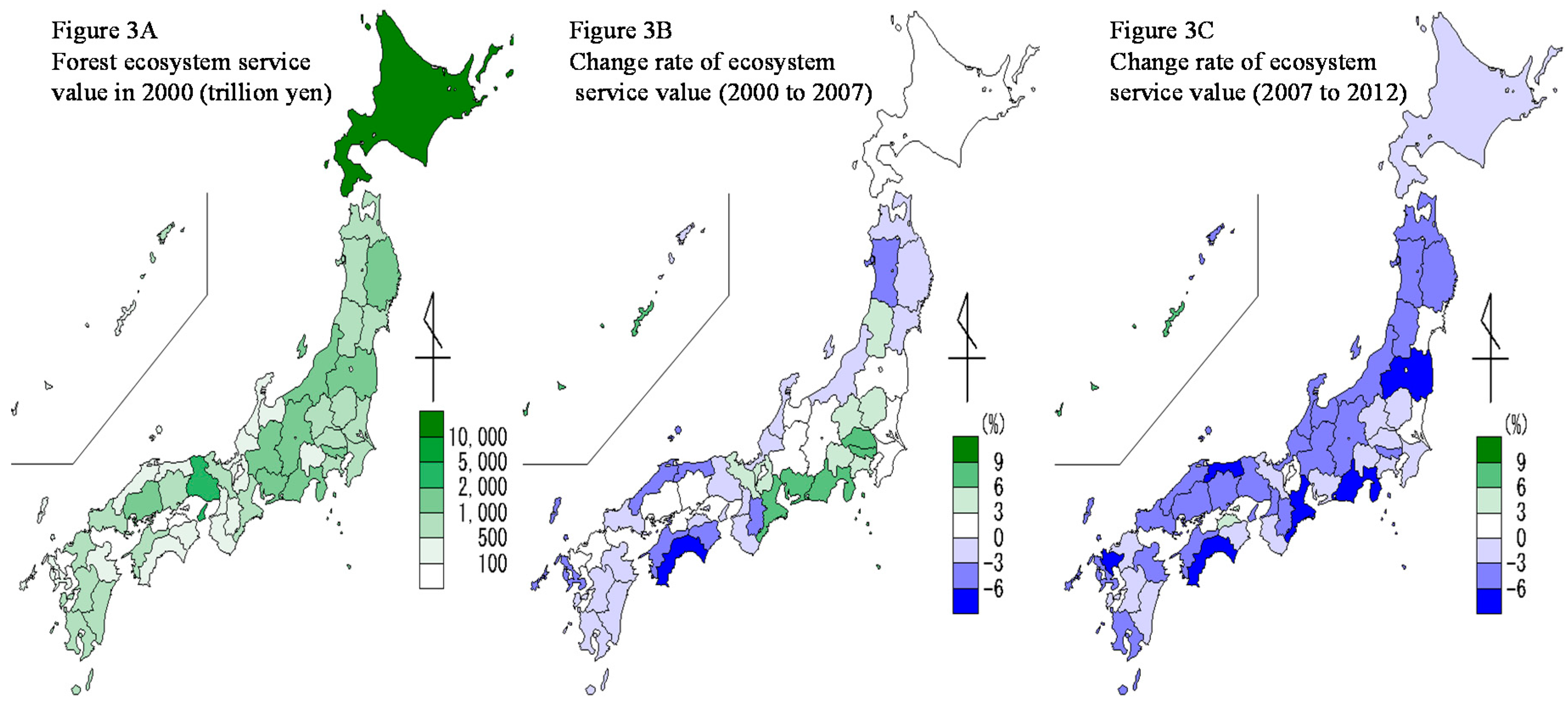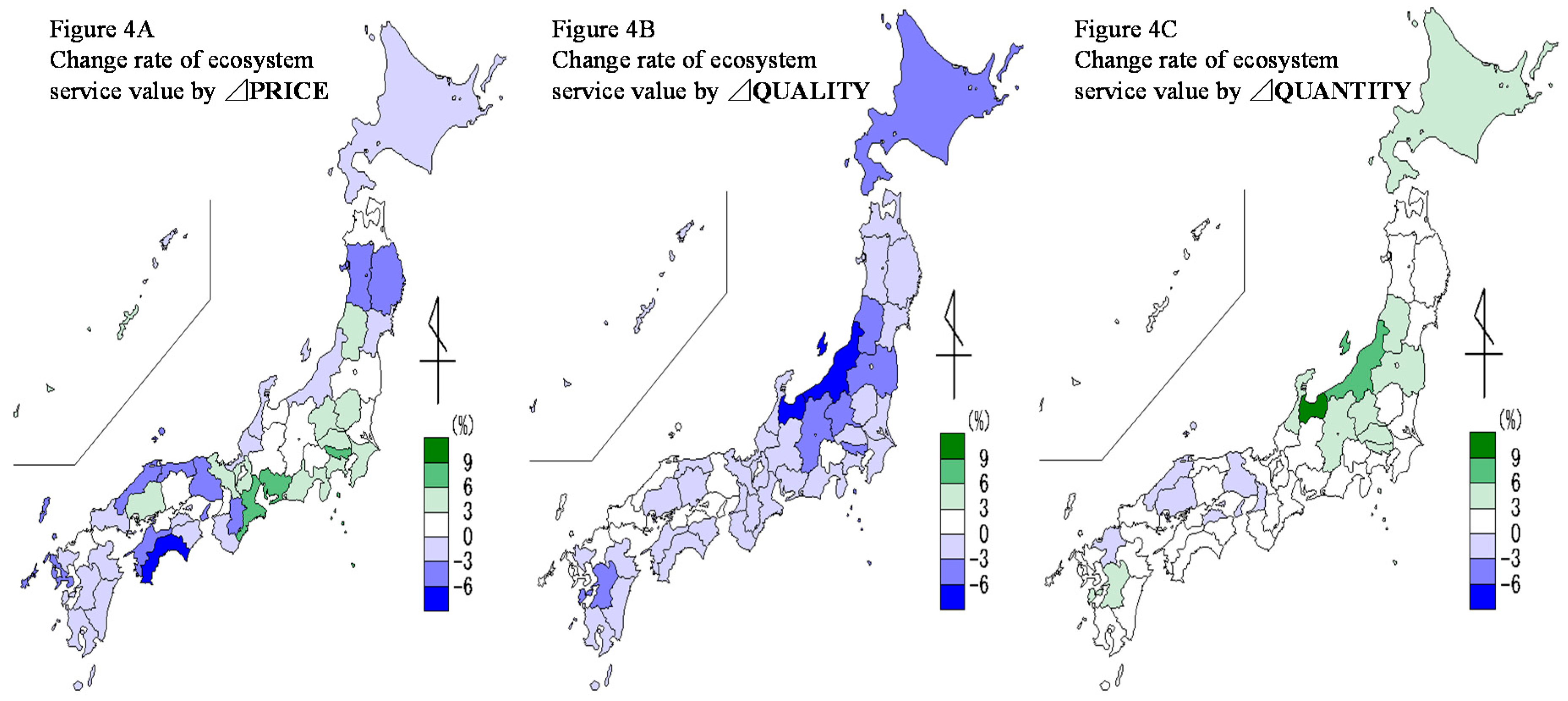Decomposition Analysis of Forest Ecosystem Services Values
Abstract
:1. Introduction
2. Estimation of the Forest Ecosystem Services Value per Area
2.1. Estimation Method
2.2. Questionnaire Survey for CVM and Forest Unit Value Estimates
3. Analysis
3.1. Decomposition Analysis of Changes in Value of Forest Ecosystem Services
3.2. Data Variables for the Decomposition Analysis
4. Results
5. Conclusions
Supplementary Materials
Acknowledgments
Author Contributions
Conflicts of Interest
References
- UNEP. Contributions of the United Nations Environment Programme (UNEP) towards Achieving the Strategic Plan of Biodiversity (2011–2020) and the Aichi Biodiversity Targets; United Nations Environment Programme: Nairobi, Kenya, 2016. [Google Scholar]
- Bai, Z.G.; Dent, D.L.; Olsson, L.; Schaepman, M.E. Global Assessment of Land Degradation and Improvement: 1. Identification by Remote Sensing. GLADA Report No. 5. 2008. Available online: http://www.isric.org/isric/webdocs/docs/Report%202008_01_GLADA%20international_REV_Nov%202008.pdf (accessed on 27 February 2017).
- UNEP. Environment, Religion and Culture in the Context of the 2030 Agenda for Sustainable Development; United Nations Environment Programme: Nairobi, Kenya, 2016. [Google Scholar]
- CDP. Global Forests Report 2015; CDP: London, UK, 2015. [Google Scholar]
- Matisoff, D.C.; Noonan, D.S.; O’Brien, J.J. Convergence in environmental reporting: Assessing the carbon disclosure project. Bus. Strategy Environ. 2013, 22, 285–305. [Google Scholar] [CrossRef]
- Ben-Amar, W.; McIlkenny, P. Board effectiveness and the voluntary disclosure of climate change information. Bus. Strategy Environ. 2015, 24, 704–719. [Google Scholar] [CrossRef]
- Miura, S.; Amacher, M.; Hofer, T.; San-Miguel-Ayanz, J.; Ernawati; Thackway, R. Protective functions and ecosystem services of global forests in the past quarter-century. For. Ecol. Manag. 2015, 352, 35–46. [Google Scholar] [CrossRef]
- Costanza, R.; D’Arge, R.; de Groot, R.; Farber, S.; Grasso, M.; Hannon, B.; Limburg, K.; Naeem, S.; O’Neill, R.V.; Paruelo, J.; et al. The value of the world’s ecosystem services and natural capital. Nature 1997, 387, 253–260. [Google Scholar] [CrossRef]
- Kumar, P. (Ed.) The Economics of Ecosystems and Biodiversity Ecological and Economic Foundations; Earthscan Publications: London, UK, 2010. [Google Scholar]
- Haines-Young, R.; Potschin, M. Proposal for a Common International Classification of Ecosystem Goods and Services (CICES) for Integrated Environmental and Economic Accounting, Report to the European Environment Agency. 2010. Available online: http://www.nottingham.ac.uk/cem/pdf/UNCEEA-5-7-Bk1.pdf (accessed on 27 February 2017).
- Maes, J.; Zulian, G.; Thijssen, M.; Castell, C.; Baró, F.; Ferreira, A.M.; Melo, J.; Garrett, C.P.; David, N.; Alzetta, C.; et al. Mapping and assessment of ecosystems and their services. In Urban Ecosystems; Publications Office of the European Union: Luxembourg, 2016. [Google Scholar]
- Rocca, M.E.; Miniat, C.F.; Mitchell, R.J. Introduction to the regional assessments: Climate change, wildfire, and forest ecosystem services in the USA. For. Ecol. Manag. 2014, 327, 265–268. [Google Scholar] [CrossRef]
- Mouchet, M.A.; Paracchini, M.L.; Schulp, C.J.E.; Stürck, J.; Verkerk, P.J.; Verburg, P.H.; Lavorel, S. Bundles of ecosystem (dis)services and multifunctionality across European landscapes. Ecol. Indic. 2017, 73, 23–28. [Google Scholar] [CrossRef]
- Zhang, Z.; Gao, J.; Fan, X.; Lan, Y.; Zhao, M. Response of ecosystem services to socioeconomic development in the Yangtze River Basin, China. Ecol. Indic. 2017, 72, 481–493. [Google Scholar] [CrossRef]
- Ninan, K.N.; Inoue, M. Valuing forest ecosystem services: Case study of a forest reserve in Japan. Ecosyst. Serv. 2013, 5, 78–87. [Google Scholar] [CrossRef]
- Rocca, M.E.; Brown, P.M.; MacDonald, L.H.; Carrico, C.M. Climate change impacts on fire regimes and key ecosystem services in Rocky Mountain forests. For. Ecol. Manag. 2014, 327, 290–305. [Google Scholar] [CrossRef]
- Fujii, H.; Managi, S. An evaluation of inclusive capital stock for urban planning. Ecosyst. Health Sustain. 2016, 2, e01243. [Google Scholar] [CrossRef]
- Sutherland, I.J.; Bennett, E.M.; Gergel, S.E. Recovery trends for multiple ecosystem services reveal non-linear responses and long-term tradeoffs from temperate forest harvesting. For. Ecol. Manag. 2016, 374, 61–70. [Google Scholar] [CrossRef]
- Adamowicz, W.; Boxall, P.; Williams, M.; Louviere, J. Stated preference approaches for measuring passive use values: Choice experiments and contingent valuation. Am. J. Agric. Econ. 1998, 80, 64–75. [Google Scholar] [CrossRef]
- FAO. Japan Forestry Outlook Study. Asia Pacific Forestry Sector Outlook Study II. Working Paper No. APFSOS II/WP/2010/30. 2010. Available online: http://www.fao.org/docrep/014/am625e/am625e00.pdf (accessed on 27 February 2017).
- Yamaguchi, R.; Sato, M.; Ueta, K. Measuring regional wealth and assessing sustainable development: An application to a disaster-torn region in Japan. Soc. Indic. Res. 2016, 129, 365–389. [Google Scholar] [CrossRef]
- Cameron, T.A.; Huppert, D.D. OLS versus ML estimation of non-market resource values with payment card interval data. J. Environ. Econ. Manag. 1989, 17, 230–246. [Google Scholar] [CrossRef]
- Bateman, I.J.; Carson, R.T.; Day, B.; Hanemann, M.; Hanley, N.; Hett, T.; Jones-Lee, M.; Loomes, G.; Mourato, S.; Özdemiroglu, E. Economic Valuation with Stated Preference Techniques: A Manual; Edward Elgar Publishing: Cheltenham, UK, 2002. [Google Scholar]
- Covey, J.; Loomes, G.; Bateman, I.J. Valuing risk reductions: Testing for range biases in payment card and random card sorting methods. J. Environ. Plan. Manag. 2007, 50, 467–482. [Google Scholar] [CrossRef]
- Rowe, R.D.; Schulze, W.D.; Breffle, W.S. A test for payment card biases. J. Environ. Econ. Manag. 1996, 31, 178–185. [Google Scholar] [CrossRef]
- Carson, R.T.; Flores, N.E.; Meade, N.F. Contingent valuation: Controversies and evidence. Environ. Res. Econ. 2001, 19, 173–210. [Google Scholar] [CrossRef]
- Jacobsen, J.B.; Lundhede, T.H.; Thorsen, B.J. The effects of current income and expected change in future income on stated preferences for environmental improvements. J. For. Econ. 2013, 19, 206–219. [Google Scholar] [CrossRef]
- Iizuka, K.; Tateishi, R. Estimation of CO2 sequestration by the forests in Japan by discriminating precise tree age category using remote sensing techniques. Remote Sens. 2015, 7, 15082–15113. [Google Scholar] [CrossRef]
- UNU-IHDP; UNEP. Inclusive Wealth Report 2014 Measuring Progress toward Sustainability; Cambridge University Press: Cambridge, UK, 2014. [Google Scholar]
- Kamo, K.; Konoshima, N.; Yoshimoto, A. Statistical analysis of tree-forest damage by snow and wind: Logistic regression model for tree damage and cox regression for tree survival. FORMATH 2016, 15, 44–55. [Google Scholar] [CrossRef]
- Ang, B.; Zhang, F.; Choi, K. Factorizing changes in energy and environmental indicators through decomposition. Energy 1998, 23, 489–495. [Google Scholar] [CrossRef]
- Ang, B.W. Decomposition analysis for policymaking in energy: Which is the preferred method? Energy Policy 2004, 32, e1131–e1139. [Google Scholar] [CrossRef]
- Fujii, H.; Managi, S. Which industry is greener? An empirical study of nine industries in OECD countries. Energy Policy 2013, 57, 381–388. [Google Scholar] [CrossRef]
- Fujii, H.; Managi, S. Decomposition of toxic chemical substance management in three U.S. manufacturing sectors from 1991 to 2008. J. Ind. Ecol. 2013, 17, 461–471. [Google Scholar] [CrossRef]
- Fujii, H.; Yoshida, K.; Sugimura, K. Research and development strategy in biological technologies: A patent data analysis of Japanese manufacturing firms. Sustainability 2016, 8, 351. [Google Scholar] [CrossRef]
- Ministry of Agriculture, Forestry and Fisheries. 2000 World Census of Agriculture and Forestry in Japan. 2000. Available online: http://www.maff.go.jp/j/tokei/census/afc/2010/report_en1.html (accessed on 27 February 2017).
- Ministry of Agriculture, Forestry and Fisheries. State of Forest Resources in 2007 [Only in Japanese]. 2007. Available online: http://www.rinya.maff.go.jp/j/keikaku/genkyou/h19/index.html (accessed on 27 February 2017).
- Ministry of Agriculture, Forestry and Fisheries. State of Forest Resources in 2012 [Only in Japanese]. 2012. Available online: http://www.rinya.maff.go.jp/j/keikaku/genkyou/h24/index.html (accessed on 27 February 2017).
- Nagasaka, K.; Böcher, M.; Krott, M. Are forest researchers only scientists? Case studies on the roles of researchers in Japanese and Swedish forest policy processes. For. Policy Econ. 2016, 70, 147–154. [Google Scholar] [CrossRef]
- Headquarters for the Revitalization of Food, Agriculture, Forestry, and Fisheries. The Basic Policy and Action Plan for the Revitalization of Japan’s Food, Agriculture, Forestry, and Fisheries: Decision of the Headquarters for the Revitalization of Food, Agriculture, Forestry, and Fisheries. 2011. Available online: http://www.cas.go.jp/jp/seisaku/npu/policy05/pdf/20120815/20120815_en.pdf (accessed on 9 November 2016).
- Nagasaka, K.; Böcher, M.; Krott, M. Science-policy interaction: The case of the forest and forestry revitalization plan in Japan. Land Use Policy 2016, 58, 145–151. [Google Scholar] [CrossRef]
- Intergovernmental Panel on Climate Change (IPCC). Climate Change 2014: Mitigation of Climate Change; Working Group III Contribution to the Fifth Assessment Report of the Intergovernmental Panel on Climate Change; IPCC: Geneva, Switzerland, 2014. [Google Scholar]
- Kayo, C.; Tsunetsugu, Y.; Tonosaki, M. Climate change mitigation effect of harvested wood products in regions of Japan. Carb. Balance Manag. 2015, 10, 24. [Google Scholar] [CrossRef] [PubMed]
- Boufi, S.; González, I.; Delgado-Aguilar, M.; Tarrès, Q.; Pèlach, M.À.; Mutjé, P. Nanofibrillated cellulose as an additive in papermaking process: A review. Carbohydr. Polym. 2016, 154, 151–166. [Google Scholar] [CrossRef] [PubMed]





| The forest has various functions that include flood control and soil maintenance as well as timber provisions, recreation, etc. Among these functions, which one is the most important? Indicate the five most important functions from the list below. (Select top five items with rank order.) |
| ( ) Timber provision |
| ( ) Security from disasters (land conservation) |
| ( ) Water purification |
| ( ) Conservation of ecosystem and biodiversity |
| ( ) Provision of recreation services |
| ( ) Spiritual and religious value |
| ( ) Amenity and aesthetic value |
| ( ) CO2 sequestration |
| ( ) Genetic resource |
| ( ) Other |
| Suppose that the local government is planning to preserve one additional hectare of forest by controlling development and promoting planting. This project requires additional public funding. How much would your household be willing to contribute to the increased costs of the project? Note that the charge will be collected by the local government and used as a fund only for the project. |
| JPY( )(the respondents answer by showing payment card) |
| Coefficient Score | Standard Error | t-Value | |
|---|---|---|---|
| β1 (income value) | 1.41 × 10−4 | 1.88 × 10−6 | 75.2 |
| β2 (woman share) | −355.45 | 18.77 | −18.94 |
| β3 (age) | −19.89 | 0.76 | −26.03 |
| β4 (natural forest share) | −337.96 | 127.82 | −2.64 |
| β5 (broadleaf share) | 694.95 | 116.24 | 5.98 |
| β6 (forest age) | −9.47 | 2.52 | −3.76 |
| Β7 (forest size) | −207.45 | 58.04 | −3.57 |
| Constant | 2897.27 | 153.14 | 18.92 |
| Sample size | 195,194 | ||
| Adj R-squared | 0.0343 | ||
| Year | Data Variable | Unit | Mean | SD | Min | Max |
|---|---|---|---|---|---|---|
| 2000 | Ecosystem services value per forest area (PRICE) | Million yen/ha | 2703 | 3053 | 525 | 17,249 |
| Tree covered land area (A) | ha | 499,825 | 719,882 | 54,059 | 5,081,098 | |
| Unstocked area | ha | 13,386 | 21,244 | 958 | 139,524 | |
| Forest area (QUANTITY) (B) | ha | 513,211 | 739,258 | 55,494 | 5,220,622 | |
| Share of tree covered area in forest area [QUALITY: (A)/(B)] | % (ha/ha) | 97.1% | 2.2% | 90.4% | 99.5% | |
| 2007 | Ecosystem services value per forest area (PRICE) | Million yen/ha | 2762 | 3226 | 502 | 18,456 |
| Tree covered land area (A) | ha | 502,923 | 734,926 | 53,771 | 5,191,577 | |
| Unstocked area | ha | 25,696 | 50,316 | 1257 | 329,089 | |
| Forest area (QUANTITY) (B) | ha | 528,619 | 781,922 | 55,301 | 5,520,666 | |
| Share of tree covered area in forest area [QUALITY: (A)/(B)] | % (ha/ha) | 95.5% | 3.7% | 78.5% | 99.0% | |
| 2012 | Ecosystem services value per forest area (PRICE) | Million yen/ha | 2688 | 3135 | 469 | 17,766 |
| Tree covered land area (A) | ha | 502,507 | 735,741 | 53,485 | 5,198,986 | |
| Unstocked area | ha | 25,558 | 49,044 | 1,088 | 318,966 | |
| Forest area (QUANTITY) (B) | ha | 528,065 | 781,587 | 55,012 | 5,517,952 | |
| Share of tree covered area in forest area [QUALITY: (A)/(B)] | % (ha/ha) | 95.6% | 3.6% | 78.5% | 99.1% |
© 2017 by the authors. Licensee MDPI, Basel, Switzerland. This article is an open access article distributed under the terms and conditions of the Creative Commons Attribution (CC BY) license (http://creativecommons.org/licenses/by/4.0/).
Share and Cite
Fujii, H.; Sato, M.; Managi, S. Decomposition Analysis of Forest Ecosystem Services Values. Sustainability 2017, 9, 687. https://doi.org/10.3390/su9050687
Fujii H, Sato M, Managi S. Decomposition Analysis of Forest Ecosystem Services Values. Sustainability. 2017; 9(5):687. https://doi.org/10.3390/su9050687
Chicago/Turabian StyleFujii, Hidemichi, Masayuki Sato, and Shunsuke Managi. 2017. "Decomposition Analysis of Forest Ecosystem Services Values" Sustainability 9, no. 5: 687. https://doi.org/10.3390/su9050687
APA StyleFujii, H., Sato, M., & Managi, S. (2017). Decomposition Analysis of Forest Ecosystem Services Values. Sustainability, 9(5), 687. https://doi.org/10.3390/su9050687






